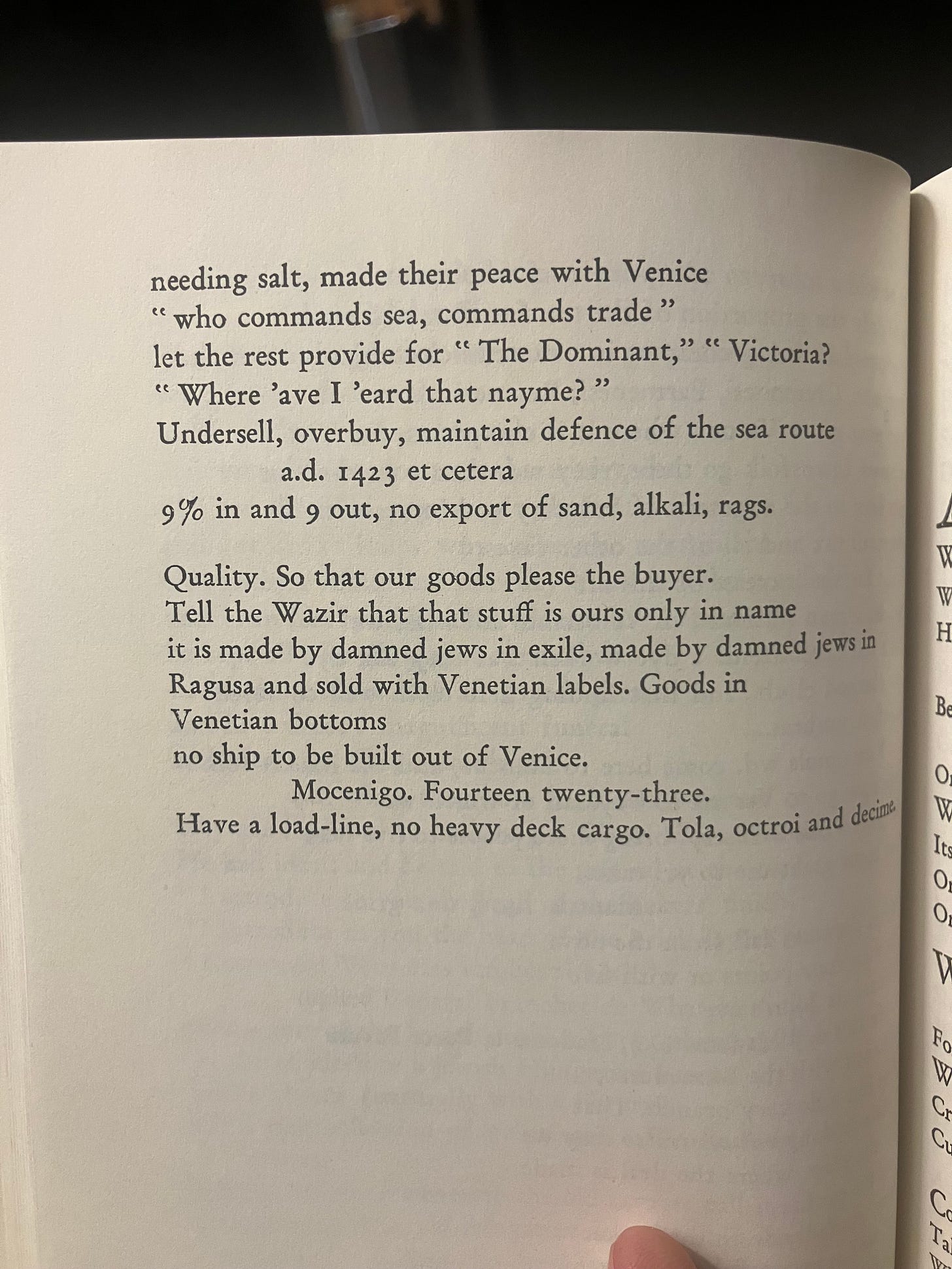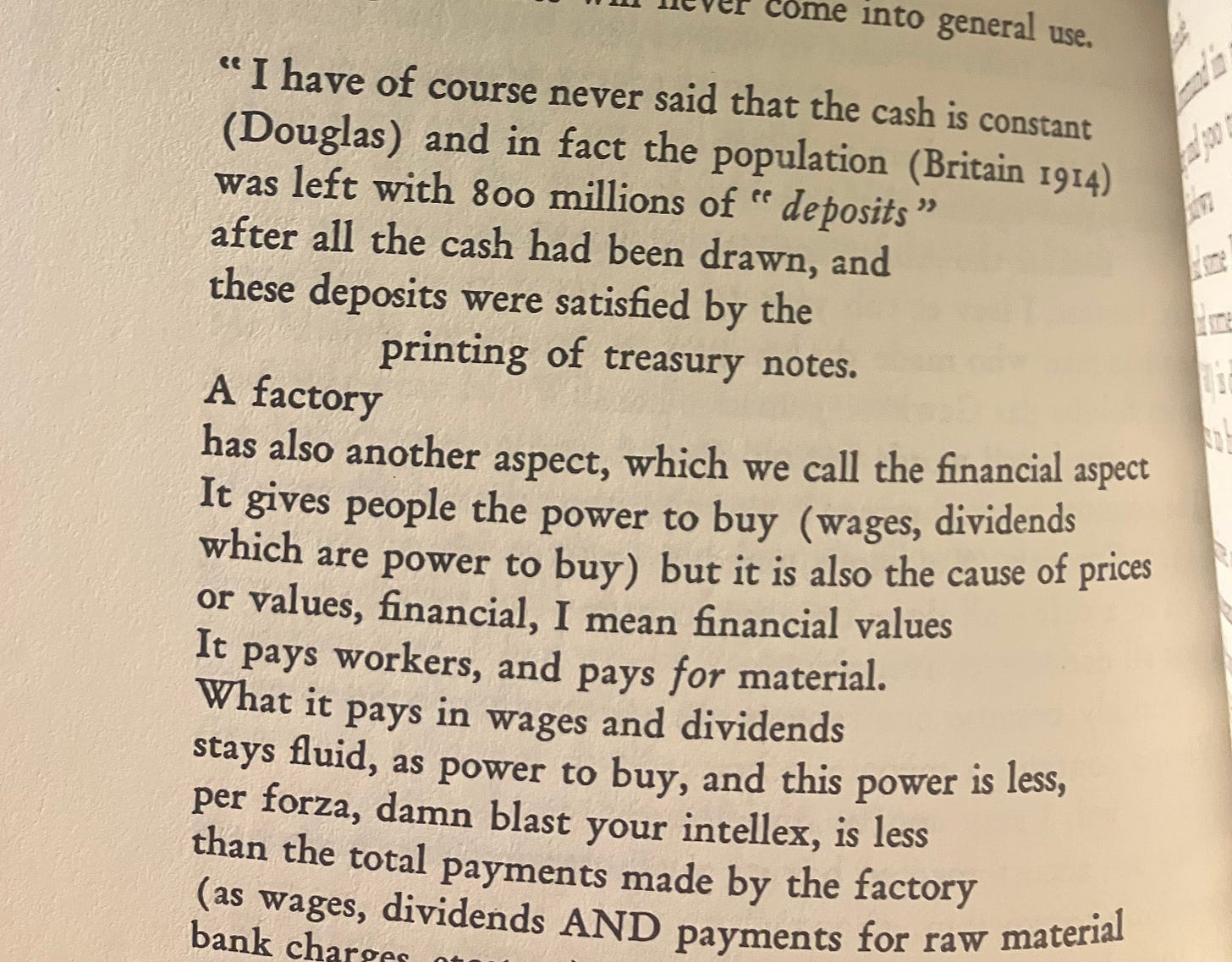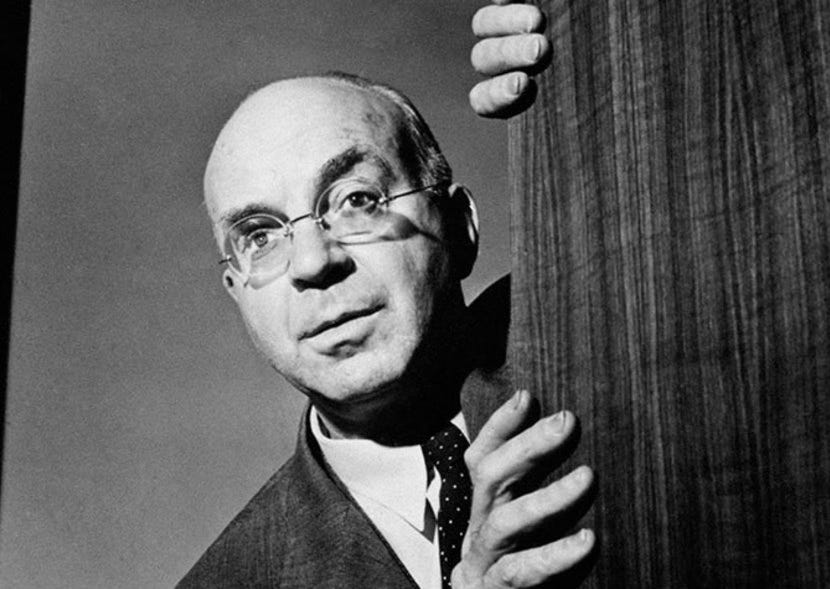Welcome back to the second installment of my public reading-through of Ezra Pound’s epic poem of the 20th century, the Cantos. This week I tackled the second section, . I found it trying, and so to help my readers and myself, I’ve seen fit to quote from such writers as returning favorite Hugh Kenner, the great New York critic Alfred Kazin, and (much more obliquely) the political philosopher Harry Jaffa. By nature these posts are messy, reflecting the source material. Enjoy!
It must be said that not even 200 pages in it is abundantly clear to me why people who are not Pound specialists or weirdos (such as myself) do not read the Cantos in full. There are scraps of brilliance, but I am currently in sympathy with the rather unamused writer at the New Criterion who wrote in 2007:
I shall merely confess to a petit-bourgeois partiality for comprehensibility and to what Pound himself called, in the nearest he ever came to a mea culpa with regard to his own ferocious anti-Semitism at a time of genocide, “a vulgar suburban prejudice” against those who suppose that their thoughts are so profound that they justify a lifetime of exegesis if ever their meaning is to be even so much as glimpsed through a glass darkly.
The economic theme is already becoming a bit much. I don’t fully understand how it all fits together, but Pound evidently believed that some sort of banking conspiracy was responsible-I’m not sure whether he believed directly or more unintentionally-for the First World War. I’m not sure it’s as nasty as it gets later on, but nonetheless there are a few menacing passages scattered throughout the section. Not looking forward to when it gets worse!
When Ryan Ruby’s long poem came out last year I saw a number of people on here and twitter accusing him of having simply separated a prose essay into stanzas.1 This may not be quite fair-I haven’t read his poem. It must be said here that Pound comes extremely close to doing this in these Cantos, in a remarkably grating manner.
Of interest to us today is the prominence of details from the early national period, especially relating to Thomas Jefferson, but stretching into the Jacksonian period and beyond. Here is how Hugh Kenner explains the use Pound makes of Jefferson in The Pound Era:
Pound's heuristic device is always the subject-rhyme. To elucidate the Italian New Birth of circa 1500, he compares it with the American of circa 1770. Specifically, Jefferson and his successors building a nation are rhymed with Malatesta building the Tempio, and a careful structural parallel enforces this rhyme.
Another notable late 20th century critic, Alfred Kazin describes something of the voluminousvdefects of Pound’s political analysis of the period in a 1986 NYRB essay. The history of American politics is my bag, but the early national and Jacksonian eras are not my period of specialization, and still, one can tell that Pound is getting the details wrong in a fairly serious way.
Shift to America, in XXXIff., as the classical republic. T.S. Eliot when fully settled in London explained that America had gone under ever since Andrew Jackson replaced John Quincy Adams. And, not as illogically as you might think, Eliot made a point on the anniversary of Richard III’s death by wearing a white rose. Pound was becoming so hipped on the currency question that he never saw the difference between John Quincy Adams and Jackson’s successor and ape Martin Van Buren. Pound had written before the Cantos, “I have beaten out my exile.” Coming from a “half savage country,” Pound felt he would redeem it by going abroad. But he had been “abroad” from the time he fell in love with Latinity and explained, “You cannot learn to write by reading English.” As the political sky over Europe grew menacing, he fastened on (selected) Founding Fathers as more Authority. From miscellaneous reading he shrilled to his private hell anyone he had sized up as an opponent on the currency question. In one of his money pamphlets Alexander Hamilton is suspected of being Jewish because he reminded Pound of Disraeli.
I feel that it would be remiss at this point not to make a slight digression to discuss the other great American modernist with an interest in Jefferson, John Dos Passos. One of a group of interwar American writers we mostly don't read anymore, Dos Passos is mostly remembered today for his mammoth three part novel U.S.A of the 1930s. There is an aesthetic case for this obscurity-USA and it's smaller predecessor Manhattan Transfer are largely footnotes to Ulysses, and it must be said that Dos Passos took one corner of the vast quilt sewn by Joyce for his own. Here is how Kazin describes this work in his classic survey of American prose up to midcentury, On Native Ground:
It is in this concern with the primacy of the individual, with his need to save the individual from society rather than to establish him in or over it, that one can trace the conflict that runs all through Dos Passos's work-between his estheticism and strong social interests; his profound absorption in the total operations of modern society and his overscrupulous withdrawal from all of them; the iron, satirical prose he hammered out in U.S.A. (a machine prose for a machine world) and the youthful, stammering lyricism that pulses under it. Constitutionally a rebel and an outsider, in much of his work up to U.S.A. a pale and self-conscious esthete, Dos Passos is at once the most precious of the lost-generation writers and the first of he American "technological" novelists, the first to bring the novel squarely into the Machine Age and to use its rhythms, ts stockpiles of tools and people, in his books.
Nonetheless it should be noted that there were political grounds for the demotion of these works as well. Dos Passos broke with the left early, largely as a result of the murder of a friend by communists during the Spanish Civil war, and the literati of that period never entirely forgave him, ironically considering where most of the surviving critics and writers of the thirties and forties wound up going politically following the 1960s. Fascinatingly, Dos Passos being à Goldwater republican has proved more harmful to his legacy than Pound's fascism.
It should be said as well that the two writers make very different uses of Jefferson. I have not read his book on Jefferson, but I am led to believe that Dos Passos was interested primarily in the pastoral self-sufficiency of Jefferson’s stated ideal, that aspect of his thought which can be more closely situated within and at the foundations of the more libertarian strand of American thought. Pound on the other hand seems to be interested, as Kenner suggests, in Jefferson as divine lawgiver, the nomothete of a new nation. Another thinker I’ve engaged with in the last year or so who saw Jefferson in this light was the original West coast Straussian and Kenner’s fellow National Review contributor Harry Jaffa. Toward the end of a long and contentious life, Jaffa laid out his view of Jefferson in the first part of his singular A New Birth of Freedom.2
In the "annual return of this day," Jefferson places that mark of traditional ceremony on the Fourth of July upon which Lincoln would build his conception of political religion. In making it the day upon which the citizens would be reminded of the reasons for their enjoyment of the blessings of freedom, Jefferson anticipates the way in which Lincoln would speak of the Fourth as if it were the American Passover. This is the day on which, in a phrase of Henry Clay that Lincoln often repeated, the cannon "thunders its annual joyous return." This is the day on which Americans are reminded of their ancestral liberation from the tyranny of the "Pharaohs" of inequality and despotism, to the "blessings and security of self-government" and the "unbounded exercise of reason and freedom of opinion." Only as each successive generation is reminded of, and instructed anew in, "the rights of man" can the blessings of liberty be perpetuated.3
As before, beauty can be found in snippets between the didactic lectures on usura and how banking is the root of the great war. There’s another Odyssey inflected passage toward the end I was particularly fond of, and many little threads of poignancy and intrigue. Next week we’ll take a look at the Fifth Decad of Cantos.
Naomi Kanakia thought it was alright, or at least didn't hate it, and I trust her judgment. I don’t know that I ever plan to read it, but who knows!
In the process of writing this section the thought “did Hugh Kenner and Harry Jaffa have beef” crossed my mind. It’s entirely possible! That being said, if such a contretemps did occur I could find no record of its existence. The closest thing I could find was this, from a 2012 American Conservative article mentioning Charles Kessler’s response to a fascinating argument made by Jeffery Hart of Dartmouth University attempting to claim modernist literature for American conservatism.
Hart’s essay seemingly won no converts—a symposium of reactions in the December 25, 1981 NR was entirely negative, including objections from Hart’s colleagues Joseph Sobran, Linda Bridges, Rick Brookhiser, and Charles Kesler. The last, a disciple of Harry Jaffa, couched his critique in terms worthy of the master: Hart was “going backward … from Burke to Hegel to Marx and Nietzsche. … The language of authenticity belongs to Heidegger, but the politics of emotion and authenticity belong to Hitler.”
Jaffa’s mature style is both possessed of a certain poetic charisma not unrelated although diametrically opposed to Pound’s, and completely impossible to parody.









Lewis Hyde in The Gift has a great chapter on Pound if you're ever looking for sources. 'Ezra Pound and the Invention of Vegetable Money' I think it's called.
Enjoying this series!
Ambitious and worthwhile. Pound has always fascinated me, and your side in Dos Passo explains why this american author has been largely erased. I also think you've added to my understanding of Lincoln's rhetorical stance and why it resonates. Well done.